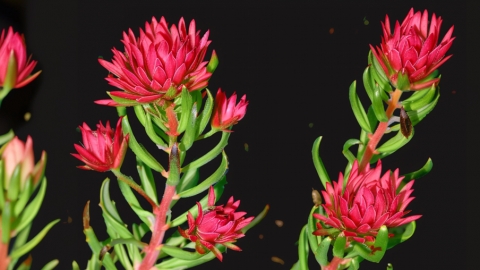What are the effects, functions, and indications of Rhodiola rosea?
Rhodiola rosea is a perennial herb belonging to the Crassulaceae family and the Rhodiola genus. It generally has functions of enhancing immunity, resisting fatigue, antioxidant effects, improving cardiovascular function, and anti-stress effects. It is commonly used for treating high-altitude reaction syndrome, ischemic diseases of the heart and brain, qi deficiency with fatigue, immunodeficiency, and chronic bronchitis. Detailed analysis is as follows:

I. Efficacy and Functions
1. Enhancing Immunity: Rhodiola rosea contains various active ingredients, such as salidroside and polysaccharides, which can enhance the body's immune function, improve resistance to viruses and bacteria, and reduce the risk of infection. It is particularly suitable for people who often feel fatigued and catch colds easily.
2. Anti-fatigue: Rhodiola rosea has anti-fatigue effects, capable of improving fatigue after physical or mental exertion and increasing work efficiency. It alleviates fatigue and restores energy by increasing intracellular energy supply and promoting metabolism.
3. Antioxidant: Rhodiola rosea is rich in antioxidants, such as flavonoids and vitamin C, which can eliminate free radicals in the body and delay the cellular aging process. This helps protect the cardiovascular and cerebrovascular systems and prevent diseases like arteriosclerosis.
4. Improving Cardiovascular Function: Rhodiola rosea can dilate blood vessels, lower blood pressure, and improve blood supply to the heart. It is suitable for adjuvant treatment of cardiovascular diseases such as hypertension and coronary heart disease. It can also enhance myocardial contractility and improve cardiac pumping function.
5. Anti-stress: Rhodiola rosea has good anti-stress effects, helping the body better cope with various stress conditions, such as mental tension and emotional fluctuations. It reduces stress responses and maintains psychological balance by regulating the neuroendocrine system.
II. Main Uses
1. High-altitude Reaction Syndrome: Containing active ingredients like salidroside, it enhances the oxygen-carrying capacity of red blood cells, improves symptoms such as dizziness, dyspnea, and palpitations in hypoxic environments, and is suitable for regulating high-altitude adaptation.
2. Ischemic Diseases of the Heart and Brain: By dilating the coronary arteries and cerebral vessels, it improves chest tightness and headaches caused by myocardial ischemia and cerebral hypoperfusion, and helps reduce blood viscosity to prevent thrombosis.
3. Qi Deficiency with Fatigue: Its qi-tonifying effect can relieve symptoms such as bodily fatigue, excessive sweating, poor appetite, and shortness of breath with reluctance to speak, enhancing physical stamina. It is suitable for individuals with chronic illness or those in the postoperative recovery phase.
4. Immunodeficiency: Polysaccharide components can activate macrophage and lymphocyte activity, enhancing immunity and reducing the frequency of recurrent colds or infections, suitable for individuals with susceptible constitutions.
5. Chronic Bronchitis: Its expectorant and antitussive effects can alleviate cough, excessive phlegm, and shortness of breath, improve inflammatory responses of the bronchial mucosa, and assist in controlling acute exacerbations.
When using Rhodiola rosea, attention should be paid to individual differences, avoiding excessive consumption. Pregnant and lactating women should use it under medical guidance.







